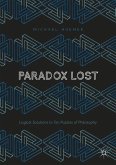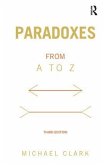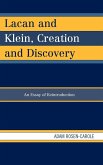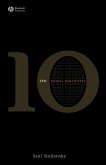A Wittgensteinian Way with Paradoxes examines how some of the classic philosophical paradoxes that have so puzzled philosophers over the centuries can be dissolved. Read argues that paradoxes such as the Sorites, Russell's Paradox and the paradoxes of time travel do not, in fact, need to be solved. Rather, using a resolute Wittgensteinian 'therapeutic' method, the book explores how virtually all apparent philosophical paradoxes can be diagnosed and dissolved through examining their conditions of arising; to loosen their grip and therapeutically liberate those philosophers suffering from them (including oneself). The book contrasts such paradoxes with real, 'lived paradoxes': paradoxes that are genuinely experienced outside of the philosopher's study, in everyday life. Thus Read explores instances of lived paradox (such as paradoxes of self-hatred and of denial of other humans' humanity) and the harm they can cause, psychically, morally or politically. These lived paradoxes, he argues, sometimes cannot be dissolved using a Wittgensteinian treatment. Moreover, in some cases they do not need to be: for some, such as the paradoxical practices of Zen Buddhism (and indeed of Wittgenstein himself), can in fact be beneficial. The book shows how, once philosophers' paradoxes have been exorcized, real lived paradoxes can be given their due.
A Wittgensteinian way with paradoxes tackles some of the classic philosophical paradoxes that have puzzled philosophers over the centuries and explores how they can be dissolved using the 'therapeutic' method of Wittgenstein, according to the 'resolute' reading of the latter's work. The book shows how, by contrast, we should give more serious consideration to real, 'lived paradoxes', some of which can be harmful psychically, morally or politically, but others of which can be beneficial.
Hinweis: Dieser Artikel kann nur an eine deutsche Lieferadresse ausgeliefert werden.
A Wittgensteinian way with paradoxes tackles some of the classic philosophical paradoxes that have puzzled philosophers over the centuries and explores how they can be dissolved using the 'therapeutic' method of Wittgenstein, according to the 'resolute' reading of the latter's work. The book shows how, by contrast, we should give more serious consideration to real, 'lived paradoxes', some of which can be harmful psychically, morally or politically, but others of which can be beneficial.
Hinweis: Dieser Artikel kann nur an eine deutsche Lieferadresse ausgeliefert werden.








